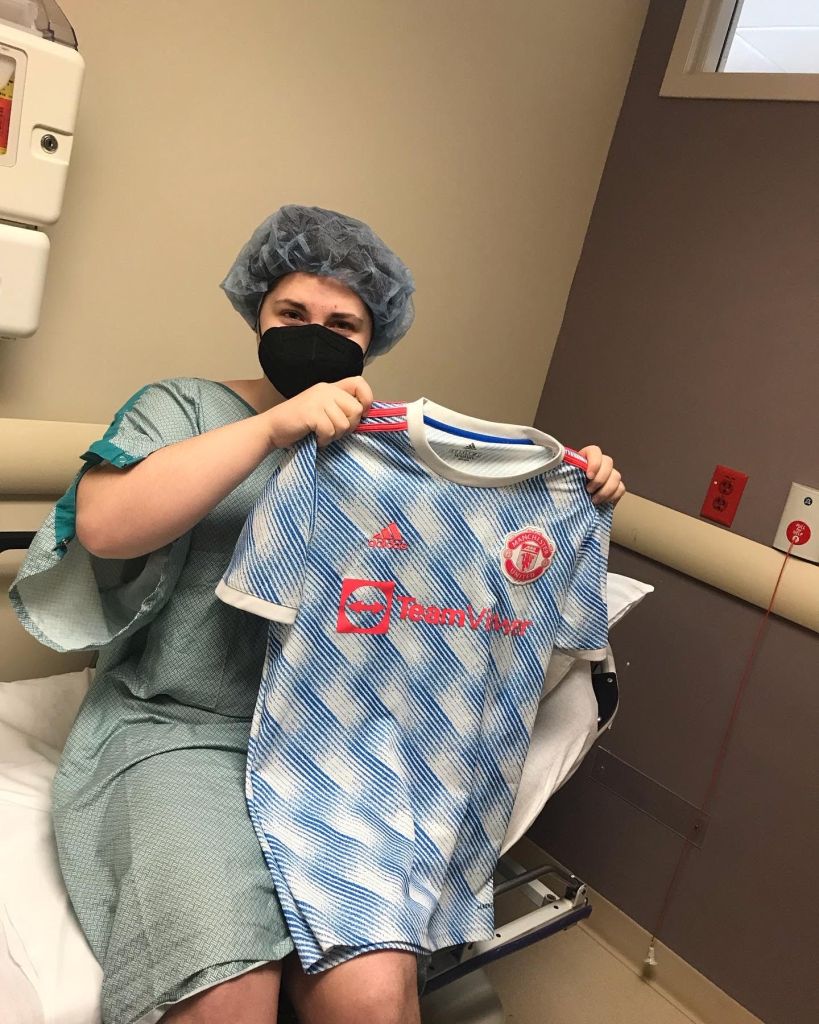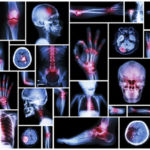
Archer Young
For our August newsletter, the Chronic Pain Partners media team interviewed a group of people to highlight the diversity of our community and emphasize the challenges that arise when a person belongs to more than one minority. In this interview, writer Beth Miller speaks with Archer Young, a young trans man with EDS and POTS. Young talks about the challenges he faces as a trans man with EDS, how he learned to advocate for accommodations, and what other trans people in the community can do to find support.
Beth Miller:
I’m so excited to speak with you and listen to your experiences. We’ll start with your EDS diagnosis. How did you find out you had EDS? And what was your diagnostic journey like?
Archer Young:
I started developing symptoms of POTS in November of 2020. I was passing out all the time, so we were really fighting for a diagnosis for POTS. This was my main issue at the time. However, then all my doctors said, “With all these other symptoms you’re having, you probably have EDS.” They couldn’t diagnose me and sent me to an EDS expert who finally diagnosed me.
Miller:
What was your experience like trying to find EDS-aware specialists in your immediate area?
Young:
No one had any idea here, where I live. I had to drive three hours to Indianapolis… Sorry if you can hear my cat; he is trying to get in. [Laughs]
Miller:
I love cats.
Young:
A world-renowned EDS specialist happened to be in Indianapolis. So that was really nice. But I had to have three doctors give me referrals for them.
Miller:
How old were you when you first started feeling symptoms?
Young:
I was 17.
Miller:
So technically, you were a minor then! Interesting. Would you like to share how you identify?
Young:
Yes, I identify as a trans man and my pronouns are he/him.
Miller:
Thank you! So as a trans man, what was your experience like? Did you face any biases throughout the EDS journey as a person who is trans?
Young:
Yes, definitely. I actually came out as trans the same time I got sick.
Miller:
Wow. That sounds tough!
Young:
I was beginning with my transition right as I was starting to have all these problems. So that was a lot. I have faced a lot of biases, but also moments where I just felt like, “Could you please simply understand. I don’t want to explain anymore.” You know? A lot of what I have experienced is because I am on testosterone – hormone replacement. Many medical professionals blame all of my medical issues on my testosterone, but that isn’t true. There’s research that shows that testosterone makes EDS symptoms better. Nevertheless, people who are uneducated want to blame it on testosterone, mainly because where I am living, being trans isn’t widely accepted. I’ve also had experiences where I explicitly told my doctors I was a trans male and they still got confused. I’ve had a doctor who, when I told them I was transgender, thought that I was a trans female. I also had to deal with transphobia a lot. Most recently, when I had a gastric emptying study and the technician was very transphobic and made me extremely uncomfortable, especially because this was a 4-hour test!
Miller:
I am sorry that you experienced that! However, you seem very well-grounded in who you are. How did you learn to advocate for yourself like that? Where did you get that skill set from? Or were you born with it?
Young:
My best answer is that I got it from my mom. It started when I got sick with POTS. When I tried to make an appointment with a specialist, they gave me one for 2022. I was literally bedbound back then! I couldn’t do anything but this was the soonest they could get me in, they said. My mom called them every single day until they gave us an earlier appointment. So I really learned advocacy from her.
I really have had to come to terms with the fact that even though I do have a rare disease, it doesn’t mean that I don’t matter. It doesn’t mean my pain is any less. I’ve had to focus on the fact that I’m worthy of treatment and help and to not live in pain.
Miller:
We deserve to be pain-free.
Young:
Exactly.
Miller:
Did doctors tell you any of the stereotypical things like, “A lot of zebras wind up going into gymnastics or dance or circuitry?”
Young:
I was a gymnast and a runner and an Olympic weightlifter.
Miller:
Oh, wow! Can you expand on that?
Young:
Well, obviously, they’re both sports that are really bad for your joints. I went to occupational therapy yesterday for the first time, and I told her that that was the sport I did in the past. And she looked at me like, “What are you doing?” I obviously don’t do that anymore because, as an Olympic weightlifter, you’re throwing a lot of weight and catching it on your wrists. So my wrists were always really flexible, and I had to tape the crap out of my body to get it to stay in place but I thought that was normal. I was also a rock climber as well. One of the people that I climbed with said, “You have such a different climbing style than all of us. You’re so flexible. You climb differently. You can put your foot over your head and then climb out of that position.” And I was like, “Yeah, I don’t know. It’s just that I’m flexible.”
Miller:
Did none of your trainers catch that that’s not normal?
Young:
Everyone just thought I was flexible. I have been a movement lover my whole life, but I always had freak accidents. I was able to do some crazy things athletic wise , but I would have pain and knee dislocations just walking to the mailbox. The conclusion all my trainers came to was that I am flexible and clumsy.
Miller:
How do you approach activities now that you’re aware of having EDS?
Young:
Occupational therapy gave me a lovely pamphlet of things that are more joint aware. So I am now focusing on preventing joint pain. I’m also working on getting oval braces for my fingers because that’s where my EDS is really bad. I’m a computer programing major, so I’m constantly typing. There are times when I have to tape my fingers to be able to type. So I’m still very much learning how to deal with all of my symptoms. I also often don’t get taken seriously by doctors because I mask everything, especially when they ask about my pain levels.
Miller:
First of all, what’s your take on the pain scale?
Young:
Every time I got the pain scale thrown at me, I was saying a lower number than what I was actually feeling because I thought that showed strength. Then I realized doing so just meant I was not going to get the help I needed. So I started saying that I live on a pain scale of seven, and every time I say a number, my mom, who comes to a lot of appointments with me because we have to drive so far and driving really far is not good for me, she says, “His pain scale is not the same as yours and mine. His seven is probably our 14.” The pain scale is different for everyone because we all have varying pain tolerance.
Miller:
How do you navigate school with pain? How do you ask for what you need at college or work?
Young:
Right before my symptoms got really bad, I was going to be signing a contract for the US Air Force.
Miller:
Oh, wow.
Young:
Then I started passing out and it never stopped. I also have that “discipline” of “suck it up,” which means my relationship with pain is not a good one. In terms of advocating for getting accommodations: I graduated high school before everything got really bad, so I didn’t have to advocate for accommodations in high school. Then I got into a local college as a dual-enrolled student. I was doing my associate’s degree at the same time that I was doing my high school diploma. So I had an extra year to finish my associate’s degree. During that year, things got really bad. Back then, I didn’t know how to ask for accommodations. I passed out one time and no one helped. And I would have days where I couldn’t go to class. Now I am working on making the world accessible to myself. Sadly, I had to decline an offer to my dream college and decided to do an online self-paced college. I currently go to the University of Phoenix in Arizona. The programs are really good. I also work with disability services and have late assignment forgiveness so that if I have a day where I cannot sit up, I don’t have to do my assignments and have an extension.
Miller:
Would you like to share your three most absurd conversations with doctors regarding you being a trans man or in relation to EDS?
Young:
The worst one was, “So, what parts do you have?” I was like, “You’re doing a gastric emptying study. You do not need to know that. You are a technician.” Additionally, I’ve had someone basically hint that if I’m such a man, I need to suck it up.
Miller:
Oh, no!
Young:
I’ve had so many absurd things said to me. This one wasn’t by a doctor, but by a random person. I was talking about the fact that right now, I can’t really go anywhere because I can’t walk for long periods of time, and I can’t use my rollator anymore because it dislocates my joints. So I told that person that I would be going to physical therapy that day to start working on getting a wheelchair, and they said, “Why don’t you just take a wheelchair from a dead person?”
Miller:
Gosh, that’s horrible! I am so sorry you had to go through this. Do you want to share some advice on what other people with EDS, who also belong to a smaller community within the community, could do to better navigate the system or where they can go for support?
Young:
- You’re not too rare to get care. Just because you have a rare disease does not make your pain any less valid.
- You are valid no matter what anyone says or what anyone thinks about you. You are valid in your identity and as an individual.
- For support: It sounds very odd, but Facebook groups work well. They are amazing if you get in the right ones. I have one called the Chronic Illness Crew. We have 150 people right now. We all have a different array of chronic illnesses, but there’s always someone that can answer your question. And a lot of times, we help ease each other’s anxiety.
Miller:
Are there any specific challenges you face due to having EDS and being trans?
Young:
Currently, I’m on the journey of getting top surgery, and I was very scared that no one was going to know about EDS and no one was going to know how to do a surgery with a central line and all that. I actually found a doctor who has operated on patients with EDS and knows how to do this surgery with my central line. And she said, for me, the only variable is that we don’t know how much scarring is going to happen afterwards. But it doesn’t hinder my surgery at all.
Miller:
Congratulations. When is this surgery?
Young:
I have my in-person consultation on June 3rd. And then, hopefully, we will schedule my surgery that day.
Miller:
How do you advocate for the right surgical team?
Young:
When I was setting up everything, I gave them a checklist of things they needed to know about my conditions in order to be my surgeon. I told them, “I need someone who’s knowledgeable about EDS and all my comorbid conditions.” And they were like, “Okay, Jessica’s your girl.” And she was actually knowledgeable. So I got very lucky. The anxiety I had was mostly related to my skin elasticity and if I would be healing well post-op. I was very worried that she would say she could not operate on me. But she assured me that maybe my scars would be a bit bigger than usual but that she could do it.
Miller:
I’m excited for you! So if you could say whatever you’d like without any repercussions – to doctors, insurance people or anyone in the medical community – what would it be?
Young:
- Go beat yourselves.
- Educate yourself. It’s not that difficult, especially with LGBTQ+ issues.
- Insurance companies: Please actually have some medical experience. Don’t just be a financial person.
- For doctors, technicians, nurses, and others: We are people. We are valid. We deserve help. Don’t act like I’m lesser than you because I am trans.
Miller:
Archer, thank you so much for making so much time for me today and for sharing with the EDS community, too. I feel like I don’t want to say goodbye. You are just such a great person.
Young:
Thanks so much!
Miller:
Well, enjoy your day. Happy EDS Awareness Month!
Young:
Yes, you too.
Miler:
Bye!
Young:
Bye!
Edited by Karina Sturm



Thank you Archer for sharing some of your story. I’m glad you are finding help. Also, how exciting that you’re getting top surgery. I hope it turns out great!
My son is trans. He also has POTS & EDS. We are in Florida, not just Florida but the panhandle area. Not progressive! Which is a nightmare. He needs better care. I feel we need to move to a safer and more knowledgeable medical care area. His life has been completely shut down due to his health. He also has Lyme disease . He started having temporal lobe seizures in his 20’s. He is 33 and has stopped driving . He can’t work. Walking, standing or pulling and lifting is a problem.
Severe chronic pain is his life. I agree with your mom… the pain scale is different for people like you and Benji.
As a mother my heart is broken.
I appreciate yours and Ms Miller’s conversation. It was kind and hopeful.
I hope we get an update on your surgery and treatment for POTS and EDS.
We wish you well.
Kricket ( Dora)